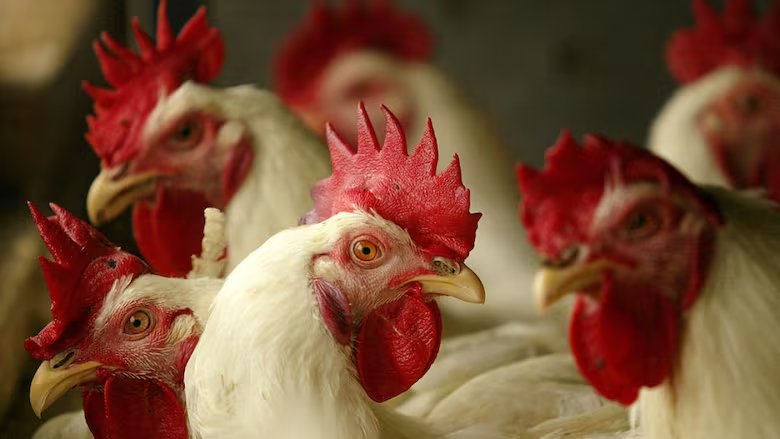Avian flu detected at 4th farm in Quebec's Eastern Townships
Better biosecurity, help from general public can help reduce spread of virus, says chicken farmer

The Canadian Food Inspection Agency (CFIA) is reporting cases of the highly pathogenic H5N1 strain of avian influenza at yet another farm in Quebec's Eastern Townships — the fourth such report in the past seven days.
The latest confirmed case of the virus was detected Sunday at a poultry farm in Les Sources, a regional county municipality (MRC), about 190 kilometres east of Montreal.
Bird flu was also detected last week in the Brome-Missisquoi, Haut-Saint-François and Val-Saint-François regions.
Experts say the virus can lead to extremely high mortality rates among flocks, either due to the virus itself or because they need to be euthanized after being exposed.
Some 100,000 birds died at the poultry farm in Val-Saint-François last week.
The CFIA says the infected sites have all been placed under quarantine, and the agency is reminding other farms in the area to be cautious and increase biosecurity.
Luce Bélanger is a chicken farmer from Saint-Gabriel-de-Valcartier, a municipality in the Capitale-Nationale region, as well as a board member of Les Éleveurs de volailles du Québec, a Quebec poultry farmers' association.
Bélanger says while she's somewhat concerned about the virus infiltrating her farm, she says taking the right precautions will likely keep it at bay.
"After learning about the first case, you know it's coming, you know it's inevitable. The migratory birds will pass overhead, so it's concerning and maybe a bit stressful, but I think if we apply our biosecurity, we should be fine."
Bélanger says good biosecurity means preventing contact between the outside and inside worlds.
"We want to keep what's inside the barn inside the barn, and what's outside, outside."
WATCH | Poultry farmers explain how bird flu is affecting them:
Objects can transfer the disease, so changing into a clean pair of clothing and boots before interacting with birds can mitigate the risk of spreading the virus, says Bélanger.
She says the general public can also help by being on the lookout for dead birds.
"If there's dead birds on streets [...] you can call [Quebec's wildlife ministry] and they will analyze those birds, especially now in the migratory season, and they will know if they're positive or not, so it will give us a good idea of how close we are to that virus."
The CFIA is reminding people that the virus rarely infects humans but makes birds quite sick, causing anything from coughing and sneezing to erratic behaviour.
People cannot become infected by eating infected poultry, the agency says.
with files from Chloë Ranaldi
